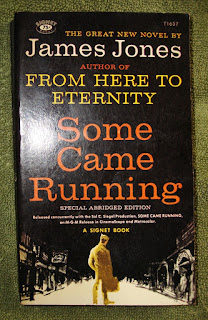I
am yet under the spell Some
Came Running
put on me fifty-two years ago. If James Jones wasn't himself a
sorcerer, he surely must have tapped into some magic reservoir of
imagination when he created the most poignant romantic tragedy I've
ever read.
I've
kept the paperback copy from 1963 but haven't opened it since. Was
afraid Jones's story might no longer affect the profound emotions it
did back then in me—a small-town Midwesterner on the verge of
running away to the Army to flee his failures. I've learned from sad
experience along the way trying to recapture a past enchantment often
dispels the memory's potency. Some
Came Running's
was one I had rather not risked losing.
What
finally prompted me to take that risk was hearing “Gwen's
Theme”
from the novel's movie version. Now, the movie left so little
impression on me I have barely a recollection of seeing it. I did not
recognize the music. Knowing what it represented, though, I could
feel through its peculiar, rending harmonies, its swells, diminishes,
and earnest tempos, the depth of longing and anguish and sorrow
shared by Gwen and her lover as they returned to me from the book. It
drew me in like a siren song. With my old paperback copy still in
boxes with hundreds of other books from my recent move, I went online
to see if maybe there was an ebook version. This is when I learned
not only that Some
Came Running
had been out of print for over half a century, but that a newly
abridged edition appeared just last year.




